'Rugby is everywhere. You go into a petrol station - people will talk to you about rugby'

“Roddy!” came the anguished cry, rasping down the terrace like a frothing tsunami. “Roddy! Sort the line-out!”
On the touchline, carting water bottles, the scale of his job struck Roddy Grant between the eyes.
A full and throbbing Kingspan was worlds apart from Murrayfield, where he’d played with and coached Edinburgh for nearly a decade, where a few-thousand souls rattled around like Tic-Tacs inside the cavernous venue.
The scrutiny on Ulster Rugby is intense; the expectations towering, even for an assistant coach, as that thick Belfast brogue made abundantly clear.
“Rugby is everywhere, everyone knows it,” Grant tells RugbyPass. “You go into a petrol station – people will talk to you about rugby. It’s awesome how it’s so well supported.
“When there were crowds, it was my favourite place to play apart from Murrayfield. It was amazing – the atmosphere, the passion. The negative side is, there’s expectation and they’re vocal if it doesn’t go well.
“I hear everything from ‘brilliant, the forwards were great, another maul try!’ to those shouts from the terracing. In terms of life experience, coaching experience, that’s awesome. Where else do you have that in life? You’re in that spotlight.”
Injury ripped away Grant’s playing career six years ago at the age of 28, and after a stint coaching in the Scottish Rugby academy system, he returned to Edinburgh as one of Richard Cockerill’s lieutenants.
For two seasons, he helped Cockerill overhaul a club riddled with inaccuracy and inconsistency, making them harder, braver, slicker; propelling them to a first PRO14 play-off and a Champions Cup quarter-final.
https://twitter.com/roddygrant/status/1007886915696250885
“It was a great place to learn under Cockers, and he was so good at being hard on standards of drill the whole time,” Grant says. “I’m really fortunate to be able to come from that environment and take that learning into this one.
“I’m a better coach now than I was when I started here. I realise coming into a place now, changing a line-out calling system takes time. Things take time to embed, relationships with players.”
In Dan McFarland, he could scarcely have found a more different mentor, full of quiet wisdoms and historical references in contrast to Cockerill’s indomitable character and occasional bull-headedness.
When McFarland took over in 2018, Ulster had lost their identity. They could be mesmeric one week and maddening the next. They lacked a core of local talent. They wanted for leadership and organisation. The nine-week trial of Paddy Jackson and Stuart Olding, both of whom were cleared of rape, had concluded only months earlier.
The former prop has resurrected this proud province. They made the PRO14 semi-final in his first campaign at the helm, then the final last term, where Leinster had their number. They lost only two league games this season, both to that same champion juggernaut. He has taken them to two Champions Cup quarter-finals and after a truncated European season, Ulster are the bookies’ favourites to win the second-tier Challenge Cup.
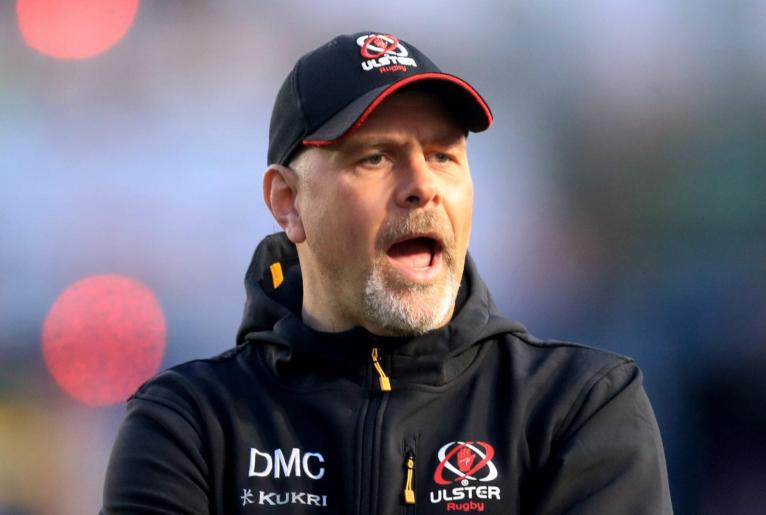
Grant’s role here is bigger than at Edinburgh, his responsibility greater.
“His ‘fight for every inch’ mantra is 100% not a new concept, but the thing I find really impressive, from Dan at the top driving it down through to the players, is how linked it is,” Grant says. “How it is actually implemented and the language about it. Each department, whether it’s rugby, athletic performance, medics, players – everything is referenced back to that.
“There is language we’ll use that incorporates that every inch. That competitive side, that real aggressive side, the performance guys will use that in the gym. We use it in skill sessions we do.
“Can I celebrate the defence stealing a line-out against our attack? Can I make a breakdown drill competitive, not so that they’re smashing into each other, but make it a race between two groups to see who cleans out the fastest?
“Physios and medical staff will use that language too. It’s how well messages are driven here.”
Grant looks after the contact and breakdown area, but his baby is the line-out. He calls the set-piece “an art”; the grass is his canvass and the players his giant, 120KG brushes.
He has painted some masterpieces this season, too. Ulster’s line-out is the finest in the Pro14, and their pack scores more tries from mauls than any side in the league.
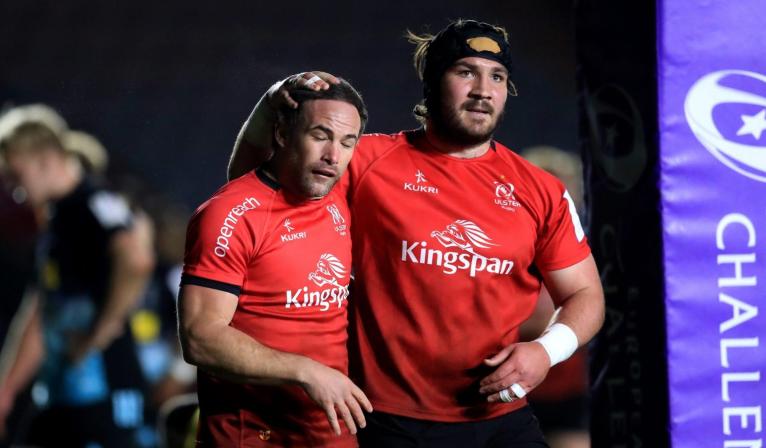
“In my first season, we had some blips, some really poor moments. Like Scotland against Ireland in the Six Nations this year. It’s like getting the yips in golf.
“They still haunt me as a coach – I joke that I have PTSD from them – but if you can come through those, they set you up brilliantly in the longer term.
“When you prep for a team and suddenly something changes and they do something different, because we’ve gone through those awful days at the office, there’s no twitching, there’s a calmness and confidence.
“We’ve driven the standards consistently, developing leaders really well. Al O’Connor has been calling the most of all the locks and he’s been brilliant. The hookers have been really consistent in their throwing. And we are missing guys through injury, like Sam Carter, Marcell Coetzee, Jack McGrath.”
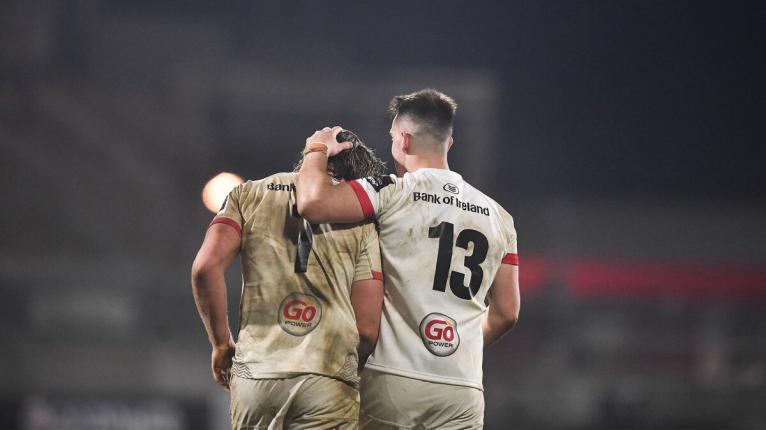
In coaching terms, Grant is still a relative pup, nearing the end of his second campaign in Belfast, but he seems moulded for the gig. He has always been a man of fierce integrity, the kind of team-first, selfless bloke who revels in the achievements of the group before his own. He flings himself at his work with the same feverish gusto as he hit rucks and scythed down opponents as a flame-haired back-row.
On Saturday, he watched Northampton Saints stun the Dragons in a see-sawing Challenge Cup tie, knowing the winners would face Ulster should they see off Harlequins. On Sunday morning, in the team hotel, he did a few hours’ swotting on Saints and their set-piece threats, before Ulster tore up The Stoop. Then it was back on the plane to Belfast, an early rise, and a full day of analysis.
“That’s the thing with coaching, mate. I got into bed about 3am on Monday, woke up, went through the game to review what we’re going to show on Tuesday. All our new line-outs for Northampton, everything needs to be good to go for 7am on Tuesday. The end of the week, I really enjoy, I’ve got more time and I can catch up with people. I’m going to speak to Paul O’Connell after our team run.”
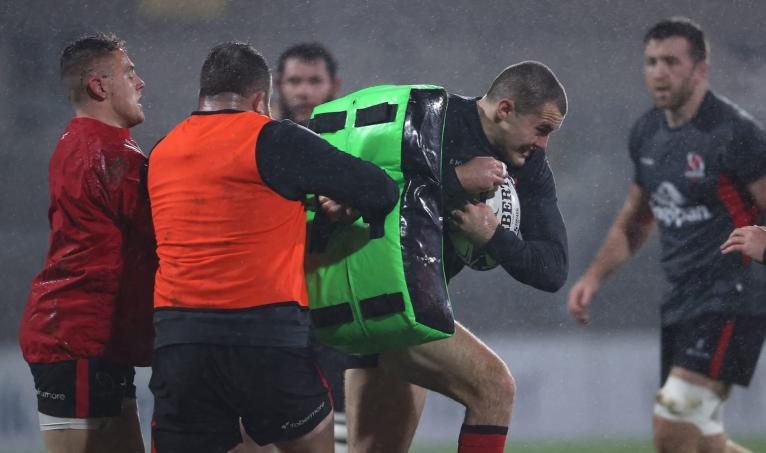
In between all of that, it was his turn for press duties, and his task to sidestep a raft of questions about Harlequins’ under-strength line-up and how seriously the English sides take the Challenge Cup.
Saints will not field such a patchwork side on Saturday, when Ulster again fly across the Irish Sea with a semi-final at stake.
“Yes, Harlequins missed a few guys but we still did what we wanted to do and scored three maul tries. This weekend, Saints have the best maul defence in the league, they concede the least metres of all the Premiership teams by a long way. Can we still deliver?
“It seems to me that the English clubs want to recruit big, physical forwards. The Leicester game, they rested a few guys but they’ve still got Jasper Wiese and they scored maul tries and were really physical around the park against Connacht.
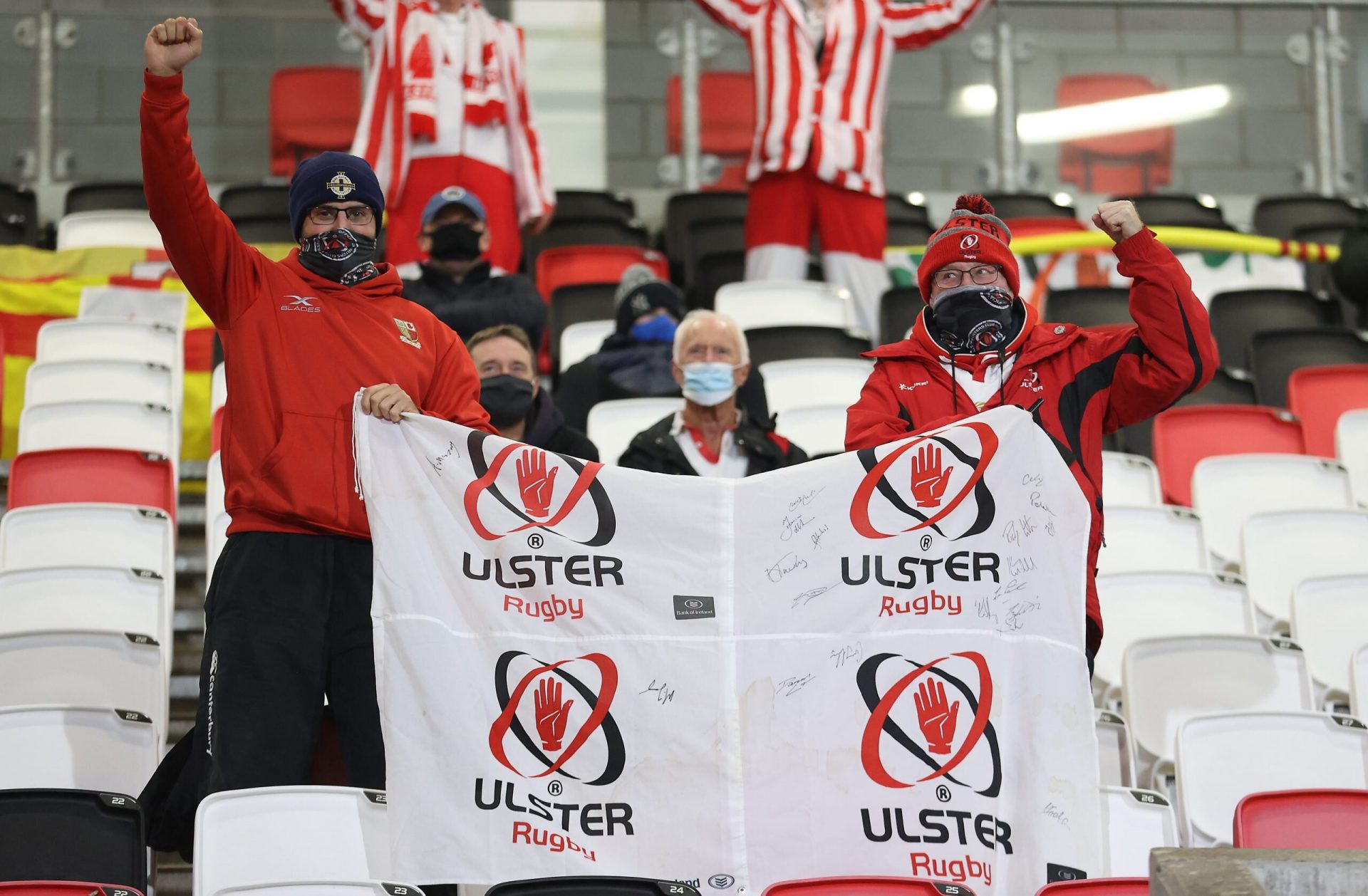
“This week, Nick Isiekwe is a brilliant player, Tom Wood and David Ribbans might be coming back. Suddenly, it’s a real challenge to win the ball in the line-out and statistically, they’re the best at defending a maul. That doesn’t take away from the fact that it’s a strong part of our game and we’re going to go after them there.”
This past year has been trying. A year like no other. If there is a positive to the bleakness of Covid-19, it is the extra time granted an industrious coach to hone his craft. There is much work to be done and gains to be made.
“I’m better in meetings, at empowering players and leadership,” Grant says. “I’m better at developing leaders in the week, changing the week, stepping back late in the week because the players need to do it at the weekend, right through to my language.
Forwards Coach, Roddy Grant signs a new two-year deal?#SUFTUM pic.twitter.com/mtXlVGrvgp
— Ulster Rugby (@UlsterRugby) February 3, 2021
“I’ve worked so hard at my language, getting mic’d up before sessions, in the gym, making sure my language is precise and I don’t waffle. I’ve got a tendency to talk and talk.
“What key language am I going to use this week? In a maul, is it ‘stay north’ or ‘momentum’ or ‘punch’, and how often am I dropping those in? Dan will review that; Matt Wilkie, the IRFU head of coach development, will review that, and so will the team at Red Sky, my agency.
“It’s an endless list of things I want to get better at. And also, I’m 34. I can’t think, off the top of my head, of a younger coach in my role just now.”
And so, to Northampton. Another hectic week; another new test; another opportunity to paint vivid pictures with his set-piece. That fella at the Kingspan can relax – the line-out has, emphatically, been sorted.










































Comments on RugbyPass
🤦♂️🤣 who cares who’s the best . All I know is the All Blacks have the star coach but have few star players now …
27 Go to commentsJe suis sûr que Farrell est impatient de jouer avec Lopez et Machenaud et d’être entraîné par Collazo… 🤭
1 Go to commentsAn on field red (aka a full red) in SRP must surely carry a bigger suspension than a red card given by the bunker as that carries a 20 minute team punishment. Had Damon Murphy abdicated his responsibility as a ref and issued both Drua players a yellow, which would have been upgraded to a 20 minute red by the bunker, that would have killed Australia and New Zealand’s push for the 20 minute red to be trialled globally from July this year.
11 Go to commentsEver so often you all post a Danny Care story that isn’t the announcement that he has finally re-signed for one more, victory tour season at Quins and I’m just like, “well you fooled me again!” My absolute favorite player ever, we need to make his final year at the Stoop (and Twickers) official already. I know he supposedly snubbed France but I won’t feel better until he signs.
1 Go to commentslate hit what late hit it wasn’t at all late and can clearly see he was committed before the tackle
1 Go to commentsChristian Lio -Willies 2 try perfomance was a standout. As was captain Scott Barrett. Up front was where the boys won it.They are a great team and players. Fantastic Crusades , you can keep going.
1 Go to commentsI don't know how the locals feel about that? I guess if you call yourselves the Worcester Wasps that might be appease. But really we need more teams in the Premiership in my view so they are not padding it out as they are at the moment. It might curtail so many players going abroad as well
5 Go to commentsNZ 😭😭😭is certainly rivaling England for best whingers cup!😭😭😭 !!!
27 Go to commentsYup. New Zealand won 3 out of 10 world cups played. SA 4 out of 8 attempts 30 Vs 50 per cent.🤔🤔
27 Go to commentsShould've done this years ago. Change Saturday kick off times to around 11am. Up and off and back home before 3pm, limit travel time too. Allows players to actually do something else with their Saturday that's family oriented or being rugby fans they could ‘watch’ pro rugby. Increases crowds etc. How can anyone that enjoys grassroots and pro rugby have to choose between the two on Saturdays?
9 Go to commentsI bet he inspired those supporters just as much.
1 Go to commentsBen Smith Springboks living rent free in his head 😊😂
67 Go to commentsGood to hear he would like to play the game at the highest level, I hadn’t been to sure how much of a motivator that was before now. Sadly he’s probably chosen the rugby club to go to. Try not to worry about all the input about how you should play rugby Joey and just try to emulate what you do on the league field and have fun. You’ll limit your game too much (well not really because he’s a standard athlete like SBW and he’ll still have enough) if you’re trying to make sure you can recycle the ball back etc. On the other hard, you can totally just try and recycle by looking to offload any and everywhere if you’re going to ground 😋
1 Go to commentsThis just proves that theres always a stat and a metric to use to justify your abilities and your success. Ben did it last week by creating an imaginary competition and now you did the same to counter his argument and espouse a new yardstick for success. Why not just use the current one and lets say the Boks have won 4 world cups making them the most successful world cup team. Outside of the world cup the All Blacks are the most successful team winning countless rugby championships and dominating the rankings with high win percentages. Over the last 4 years statistically the Irish are the best having the highest win rate and also having positive records against every tier 1 side. The most successful Northern team in the game has been England with a world cup title and the most six nations titles in history. The AB’s are the most dominant team in history with the highest win rate and 3 world cups. Lets not try to reinvent the wheel. Just be honest about the actual stats and what each team has been good at doing and that will be enough to define their level of success.
27 Go to commentsHow is 7’s played there? I’m surprised 10 or 11 man rugby hasn’t taken off. 7 just doesn’t fit the 15s dynamics (rules n field etc) but these other versions do.
9 Go to commentsPick Swinton at your peril A liability just like JWH from the Roosters Skelton ??? went missing at RWC
14 Go to commentsLike tennis, who have a ranking system, and I believe rugby too, just measure over each period preceding a world cup event who was the longest number one and that would be it. In tennis the number one player frequently is not the grand slam winner. I love and adore the All Blacks since the days of Ian Kirkpatrick when I was a kid in SA. And still do because they are the masters of running rugby and are gentleman on and off the field - in general. And in my opinion they have been the majority of the time the best rugby team in the world.
27 Go to commentsHaving overseas possessions in 2024 is absurd. These Frenchies should have to give the New Caledonians their freedom.
21 Go to commentsBell injured his foot didn’t he? Bring Tupou in he’ll deliver when it counts. Agree mostly but I would switch in the Reds number 8 Harry Wilson for Swinton and move Rob Valentini to 6 instead. Wilson is a clever player who reads the play, you can’t outmuscle the AB’s and Springboks, if you have any chance it’s by playing clever. Same goes for Paisami, he’s a little guy who doesn’t really trouble the likes of De Allende and Jordie Barrett. I’d rather play Carter Gordon at 12 and put Michael Lynagh’s boy at 10. That way you get a BMT type goalkicker at 10 and a playmaker at 12. Anyways, just my two cents as a Bok supporter.
14 Go to commentsThanks Brett, love your articles which are alway pertinent. It’s a difficult topic trying to have a panel adjudicating consistently penalties for red card issues. Many of the mitigating reasons raised are judged subjectively, hence the different outcomes. How to take away subjective opinions?
11 Go to comments